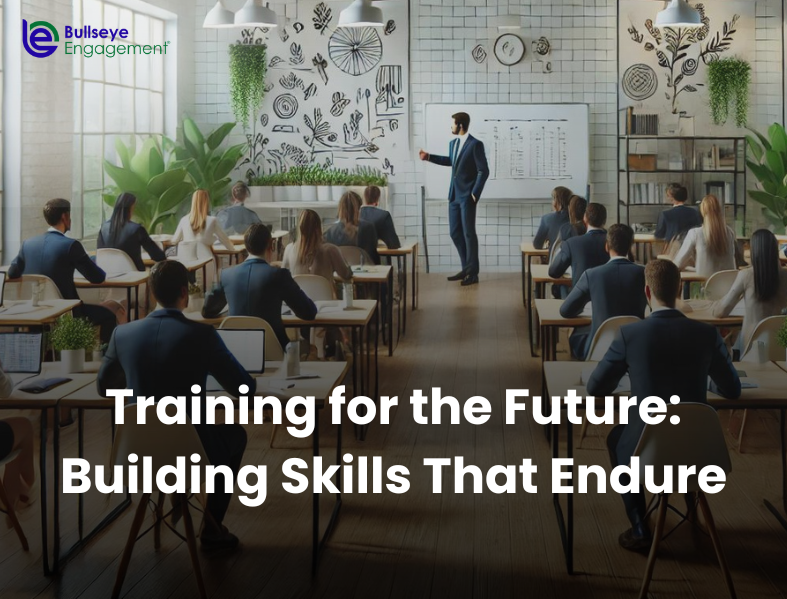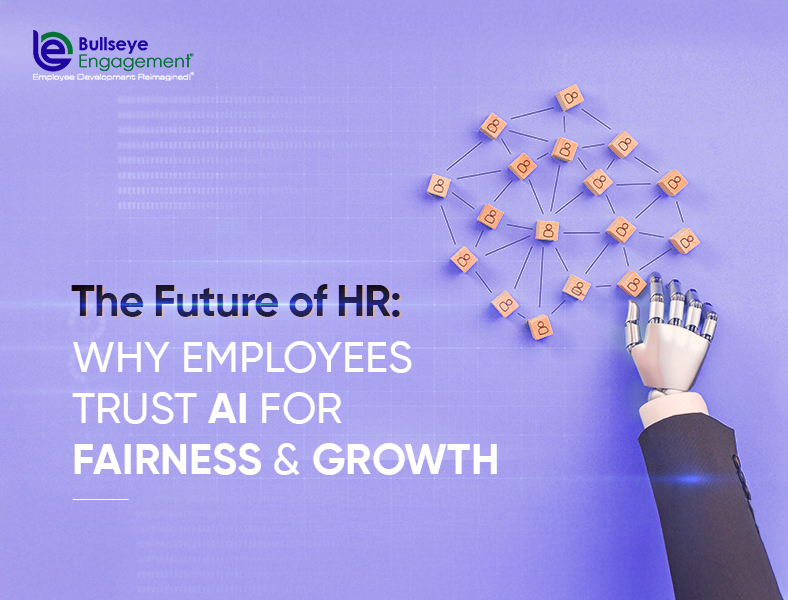In the whirlwind of today’s fast-paced business landscape, it’s easy to get caught up in the demands of the present. However, for organizations intent on long-term success, the question isn’t just about what skills employees need now—but what skills will they need in the years to come. The future is unpredictable, but one thing is clear: companies that invest in future-proof training will be best positioned to thrive, no matter what comes their way.
At BullseyeEngagement, we believe that the key to enduring success lies in developing skills that stand the test of time. In this blog, we’ll dive into the essential skills that will remain valuable in the face of change and how your organization can seamlessly integrate these into your training programs.
Critical Thinking and Problem-Solving
As technology continues to automate routine tasks, the human ability to think critically and solve complex problems becomes ever more crucial. These skills are what enable employees to navigate challenges, anticipate obstacles, and devise innovative solutions that machines simply can’t replicate.
Why It’s Essential: In an era where change is the only constant, employees who can approach problems with a critical mind will be the ones who drive the organization forward. Critical thinking isn’t just about solving today’s problems; it’s about anticipating tomorrow’s opportunities.
How to Foster It: Implement scenario-based learning exercises in your training programs. These exercises should challenge employees to think on their feet, consider multiple perspectives, and devise strategic solutions—skills that will serve them well in any situation.
Emotional Intelligence (EQ)
The future of work isn’t just about technical skills; it’s also about understanding and managing emotions—both one’s own and those of others. Emotional Intelligence (EQ) plays a pivotal role in communication, leadership, and collaboration, making it a skill that’s indispensable in any workplace.
Why It’s Essential: In a world where collaboration is key, EQ is the glue that holds teams together. It fosters better relationships, enhances communication, and creates a more cohesive, supportive work environment.
How to Foster It: Start by incorporating EQ assessments into your training. Follow up with workshops that focus on empathy, active listening, and conflict resolution. Encourage leaders to model these behaviors, setting the tone for the entire organization.
Adaptability and Resilience
Adaptability isn’t just a nice-to-have; it’s a must-have. As industries evolve and new challenges emerge, the ability to adapt quickly and recover from setbacks becomes a defining trait of successful employees.
Why It’s Essential: The pace of change is accelerating, and organizations need employees who can not only keep up but thrive amid the turbulence. Resilience ensures that employees can bounce back from challenges, while adaptability allows them to pivot when necessary.
How to Foster It: Offer training that emphasizes a growth mindset—where challenges are viewed as opportunities for development. Provide resources that help employees build resilience, such as stress management techniques and mindfulness practices.
Digital Literacy and Technological Proficiency
As technology permeates every aspect of work, digital literacy is no longer optional—it’s essential. Employees need to be comfortable navigating the digital landscape, understanding emerging technologies, and using digital tools to enhance their work.
Why It’s Essential: The digital revolution is reshaping industries, and employees who are tech-savvy will be better equipped to innovate and stay ahead of the curve. Digital literacy is the foundation upon which other skills are built in the modern workplace.
How to Foster It: Ensure your training programs include ongoing digital education. Cover the basics—like software proficiency—as well as more advanced topics, such as data analytics and artificial intelligence. Encourage a culture of continuous learning where staying updated on technological advancements is the norm.
Leadership and Strategic Thinking
The ability to lead and think strategically is crucial for navigating an unpredictable future. Leadership isn’t just about managing people; it’s about inspiring them, guiding them through uncertainty, and making decisions that align with long-term goals.
Why It’s Essential: Strong leaders are the anchors in a storm. They provide direction, make informed decisions, and motivate teams to achieve their best, even when the path ahead is unclear.
How to Foster It: Develop leadership programs that focus on strategic thinking and decision-making. Provide opportunities for employees to lead projects or initiatives, allowing them to apply what they’ve learned in a real-world context.
Collaboration and Teamwork
In a world where collaboration across geographies, disciplines, and industries is increasingly common, the ability to work effectively in teams is more important than ever. Strong teamwork is the bedrock of successful projects and organizational growth.
Why It’s Essential: Collaboration brings diverse perspectives together, leading to more innovative solutions and stronger results. Employees who can work well in teams are better equipped to contribute to the collective success of the organization.
How to Foster It: Integrate team-based projects and collaborative tools into your training programs. Focus on building communication skills, resolving conflicts, and fostering a collaborative spirit—even in remote or hybrid work environments.
Lifelong Learning and Intellectual Curiosity
The most successful employees aren’t just those who know the most—they’re those who are always eager to learn more. Intellectual curiosity drives innovation, creativity, and continuous improvement, making it a critical skill for the future.
Why It’s Essential: The world is constantly changing, and employees who are committed to lifelong learning will always be one step ahead. They’re the ones who will push boundaries, explore new ideas, and drive the organization forward.
How to Foster It: Create a culture that encourages continuous learning. Offer access to courses, workshops, and other learning resources. Celebrate curiosity by recognizing employees who take the initiative to expand their knowledge and skills.
Conclusion: Future-Proofing Your Workforce with BullseyeEngagement
At BullseyeEngagement, we understand that the future is full of unknowns. But by focusing on developing these enduring skills, organizations can ensure their workforce is not just prepared—but primed to thrive in whatever future unfolds.
By integrating critical thinking, emotional intelligence, adaptability, digital literacy, leadership, collaboration, and lifelong learning into your training programs, you’re not just preparing your employees for the future—you’re investing in the long-term success of your organization.
To learn more about how to build a future-ready workforce, visit BullseyeEngagement.com. Let’s work together to equip your team with the skills that will stand the test of time.

















